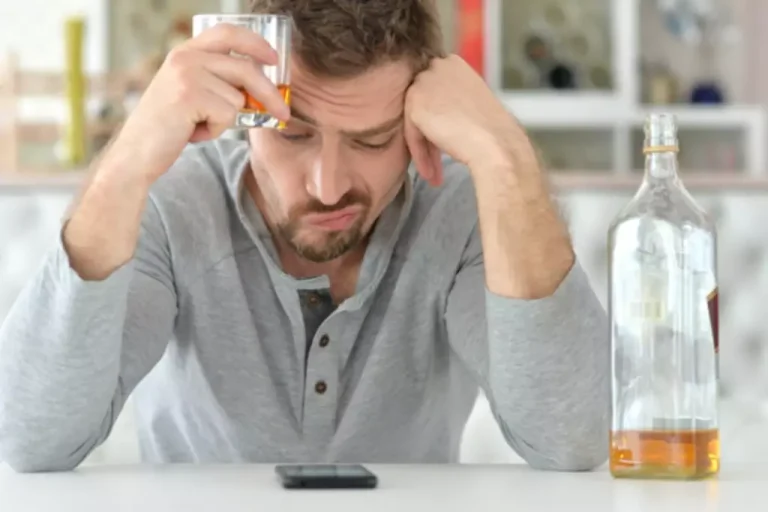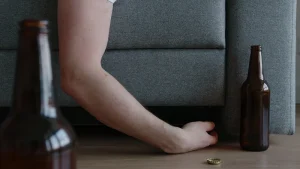How Does Alcohol Affect Your Mental Health?

The prevalence of AUD among persons treated for anxiety disorders is in the range of 20% to 40%,2,15 so it is important to be alert to signs of anxiety disorders (see below) in patients with AUD and vice versa. As shown in the schematic, AUD and other mental health disorders occur across a spectrum from lower to higher levels of severity. For patients in the middle, with up to a moderate level of severity of AUD or the psychiatric disorder or both, a decision to refer should be based on the level of comfort and clinical judgment of the provider. Here, we briefly describe the causes and effects of co-occurrence, the mental health disorders that commonly co-occur with AUD, and the treatment implications for primary care and other healthcare professionals. We start with a visual model of care that indicates when to consider a referral.

Drinkchat
- This could have a carryover effect on depression since loneliness and lack of social support are linked to depression.
- When treating depression and substance abuse, consult with a mental health professional and/or an addiction specialist who can provide resources and recommendations for possible treatment options.
- If you or a loved one is struggling with a co-occurring mental health disorder and alcohol addiction, it’s important to remember that you are not alone.
- People who have both tend to have more severe symptoms than those who have only one disorder.
- For example, AUD that develops after the onset of a depressive disorder and is characterized by coping motives for alcohol use may differ critically from a depressive disorder that develops following chronic alcohol administration.
In this section, trials that used medication and psychotherapy treatments are discussed, as are the effects of those treatments on depressive symptoms and AUD symptoms. There is a lot that we still need to understand about the link between alcohol and depression, and this is an emerging area of research. Existing research indicates that depression can cause alcohol overuse, and alcohol overuse can cause depression.
- The link between depression and alcohol use disorder is complex.
- If you’re battling depression, alcohol isn’t going to make you feel better.
- A 2012 study found that 63.8% of people who are dependent on alcohol are also depressed.
- Drinking a lot may worsen these feelings, which may actually drive further drinking.
- These tests help them calculate your risk factors for either condition.
Diagnosis of depression in alcohol dependence: changes in prevalence with drinking status
When you have healthy habits in place to cope with unwanted feelings, you’ll probably find it easier to use these strategies to push back against distressing emotions you might https://ecosoberhouse.com/article/how-to-rebuild-your-life-after-addiction-how-to-regain-trust/ experience while drinking. Bad sleep can easily affect your mood the next day, since exhaustion and lingering physical symptoms can make it tough to concentrate. You might feel depressed after drinking because alcohol itself is a depressant. While alcohol use can directly trigger feelings of depression, it can also contribute to symptoms in more indirect ways. The more you drink, however, the more likely your emotional state will begin plummeting back down. Sometimes, alcohol can make you feel even worse than you did before.

Ethnic diversity and health outcomes
- Everyone feels blue or down from time to time, and people often say that they feel “depressed” during these temporary bouts of sadness.
- Alcohol slows down processes in your brain and central nervous system, and can initially make you feel less inhibited.7 In the short-term, you might feel more relaxed – but these effects wear off quickly.
- However, evidence suggests that more than 25% of people in treatment have experienced a substance-induced depressive episode in their lifetime.
- When it comes to diagnosing an alcohol use disorder and a major depressive disorder, it’s important to address them simultaneously, as they can significantly impact your recovery.
Even if they don’t improve immediately, you’ll probably have an easier time doing something about them when you don’t have to deal with physical symptoms, too. If you already feel a little low, giving yourself a hard time for overdoing the alcohol probably won’t improve matters. You might also want to consider natural supplements such as tyrosine, 5-HTP, and ashwagandha to help rebalance your brain’s neurotransmitters. Just check with your doctor before trying these, especially if you’re taking medication. Additionally, genetics may influence how likely you are to develop depression and a substance use disorder (SUD). This article covers everything you need to know about the connection between alcohol and depression.
- John C. Umhau, MD, MPH, CPE is board-certified in addiction medicine and preventative medicine.
- It also includes binge drinking — a pattern of drinking where a male has five or more drinks within two hours or a female has at least four drinks within two hours.
- Depression is different to anxiety (a feeling of worry or fear about what might happen, inability to concentrate and – for some people – panic attacks).

During therapy, you can learn coping mechanisms that can help you return to life without drinking. However, for the best results, your doctor will likely treat them together. It’s not always clear if depression makes you drink or vice versa. Studies of twins have shown that the same things that lead to heavy drinking in families also make depression more likely. Depending on the severity of the disorders, you may need more intense treatment, such as outpatient care, integrated assertive community (ACT) treatment alcohol and depression or a residential stay, which may be required to begin or continue your recovery journey.
Bài viết liên quan
İdman mərclərində bank idarəetməsi – Betandreas istifadəçiləri üçün təvsiyələr
Mystake App Regelmäßige Updates für neue Spiele und Funktionen
Как избежать ошибок при игре в Arkada Casino советы для игроков
How to Rebuild Your Life: Strategies for Long-Term Recovery
Identifying Roofie Signs
Alcohol and allergies: Does it make them worse?
What is a Halfway House? Benefits, Rules & Cost
How Long Does Alcohol Stay In Your System? Timeline + Video
The Difference Between Alcohol and Ethanol
Danh mục tin tức
- ! Без рубрики
- ++novPU
- 1
- 1 win
- 1w
- 1win
- 1Win AZ Casino
- 1Win Brasil
- 1win Brazil
- 1win casino
- 1win casino spanish
- 1win fr
- 1win India
- 1WIN Official In Russia
- 1win Turkiye
- 1win uzbekistan
- 1winRussia
- 1xbet apk
- 1xbet Casino AZ
- 1xbet casino french
- 1xbet india
- 1xbet Korea
- 1xbet KR
- 1xbet malaysia
- 1xbet russia
- 1xbet russian
- 1xbet russian1
- 1xSlots
- 2
- 22 Bet
- 222
- 22bet IT
- 240651 done
- 3 Reyes Casino
- 7k casino
- 9400_wa
- 9500_wa
- 9600_wa
- abilify
- adderall
- AI News
- anticoagulantia
- apotheek
- Aviator
- aviator brazil
- aviator casino DE
- aviator IN
- aviator mz
- aviator ng
- Bankobet
- Basaribet
- bbrbet mx
- Best Australian Online Casinos and Pokies
- Best Australian Online Casinos and Pokies with PayID in 2025
- bhdec
- bizzo casino
- blog
- book of ra
- book of ra it
- Bookkeeping
- btbtnov
- casino
- casino 7k
- casino en ligne
- casino en ligne fr
- casino en línea
- casino onlina ca
- casino online
- casino online 1win
- casino online ar
- casinò online it
- casino-glory india
- casinos
- Casinos en Línea
- cassino online
- CheckBasinas
- Chưa được phân loại
- crazy time
- Cryptoboss Сasino
- Cryptocurrency exchange
- Cryptocurrency service
- csdino
- diabete
- diabetes
- Dịch vụ
- Dịch vụ ship hộ
- dk
- done
- done 15381
- done 240244
- done now
- DragonMoney
- Đặt hàng trung quốc
- e-Kitap Depolama
- ed
- en
- epilepsi
- epilepsie
- epilessia
- esteroides
- FAQ
- fi
- Financial Marketplace in the USA
- FinTech
- Forex Trading
- fr
- Gama Casino
- Gambling
- gewichtsverlies
- Gigabet cassino
- hd porn
- Internet Business, Audio-Video Streaming
- it
- IT Education
- IT Образование
- ivermectine
- Kasyno Online PL
- king johnnie
- ledger live
- lera 123
- levitra
- Lex Casino
- lucky jet
- Masalbet
- mostbet
- Mostbet Casino AZ
- mostbet italy
- mostbet ozbekistonda
- Mostbet Russia
- mostbet tr
- New
- New Post
- News
- nl
- online casino
- online casino au
- onlone casino ES
- ozwin au casino
- pb_dec
- PDF eBooks Kulübü
- pelican casino PL
- pharmacie
- Pin Up Brazil
- Pin Up Casino
- Pin Up Peru
- pinco
- Plinko
- plinko in
- plinko UK
- potency
- pujan
- Ramenbet
- ricky casino australia
- ritalin
- rybelsus
- se
- Slots
- Sober living
- Software development
- Stake Casino
- StarzBet Casino
- steroid
- steroides
- sweet bonanza TR
- Tin tức
- Tin tuyển dụng
- Unlim казино
- Vận chuyển hàng trung quốc
- verde casino hungary
- Vovan Casino
- Ауф казино
- Водка Казино
- займы онлайн
- Комета Казино
- Лекс Казино
- Финтех
- Форекс Брокеры
- Форекс обучение
- Швеция
- 온라인 카지노 사이트
Tin nổi bật
Bài viết mới
-
Turkey Aviator – online bookmakers odds
Posted on
Tags
- chuyên nhập hàng trung quốc
- cách nhập hàng quảng châu
- cách nhập hàng taobao
- cách nhập hàng Trung Quốc
- cách nhập hàng trung quốc giá rẻ
- cách nhập hàng trên 1688
- cách nhập hàng trên taobao
- cách nhập hàng từ 1688
- cách nhập hàng từ taobao
- giá order hàng trung quốc
- hướng dẫn nhập hàng 1688
- hướng dẫn nhập hàng Trung Quốc
- hướng dẫn nhập hàng trên taobao
- khuyến mãi ngày 11.11
- kinh nghiệm nhập hàng 1688
- kinh nghiệm nhập hàng từ taobao
- lấy hàng từ trung quốc về bán
- muốn nhập hàng từ trung quốc
- mối nhập hàng trung quốc
- nhập buôn hàng quảng châu
- nhập giày quảng châu
- nhập hàng 1688
- nhập hàng quảng châu
- nhập hàng quảng châu giá rẻ
- nhập hàng quảng châu trung quốc
- nhập hàng quảng châu tận gốc
- nhập hàng sỉ trung quốc
- nhập hàng taobao
- nhập hàng taobao 1688
- nhập hàng taobao giá rẻ
- nhập hàng taobao uy tín
- nhập hàng taobao về bán
- nhập hàng Trung Quốc
- nhập hàng trung quốc giá sỉ
- nhập hàng Trung Quốc uy tín
- nhập hàng Trung Quốc về Việt Nam
- nhập hàng trên taobao
- Nhập hàng trênTaobao
- nhập khẩu hàng trung quốc
- nhập quần áo quảng châu
- Taobao
- tet nguyen dan
- thong bao lich nghi
- tìm nguồn hàng trung quốc giá rẻ
- vận chuyển Trung Quốc Việt Nam
 Bonuses for new players
Bonuses for new players 
